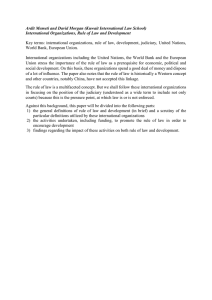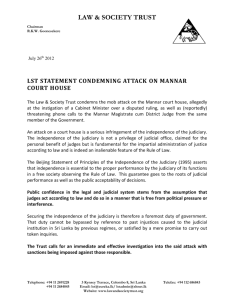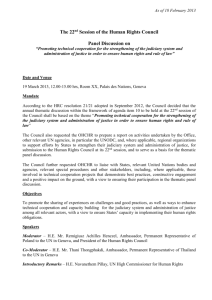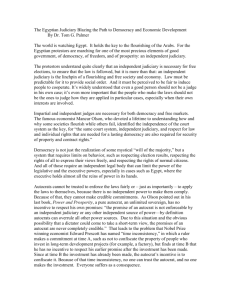Kom vadlinijas-18 05 2015_apstiprinatais
advertisement
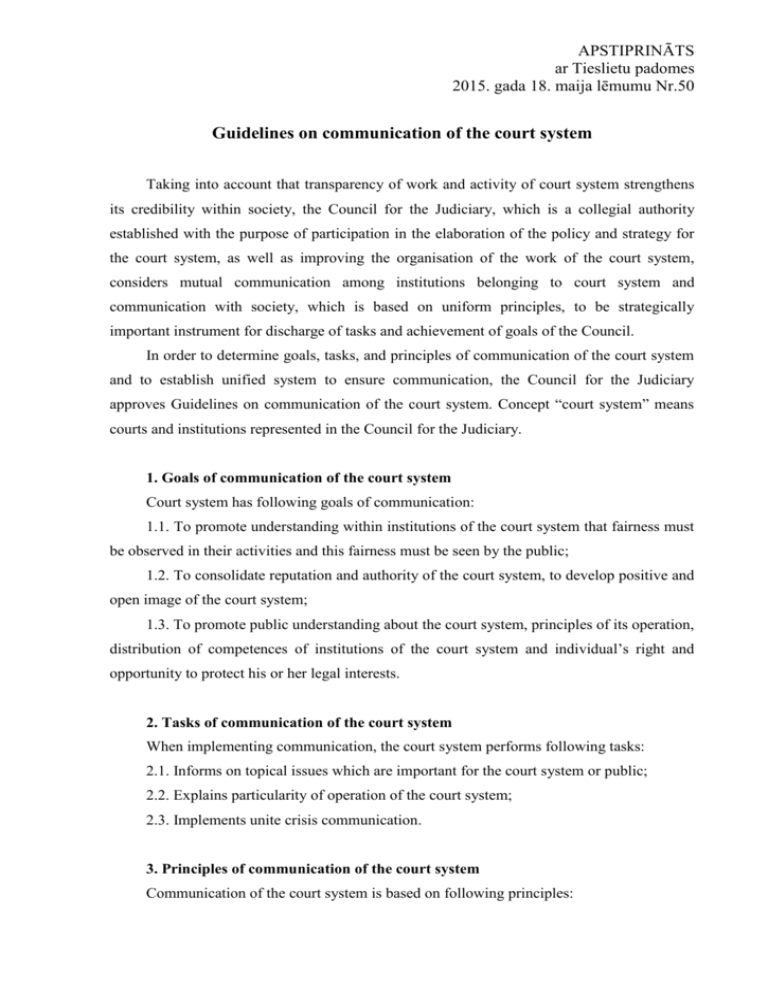
APSTIPRINĀTS ar Tieslietu padomes 2015. gada 18. maija lēmumu Nr.50 Guidelines on communication of the court system Taking into account that transparency of work and activity of court system strengthens its credibility within society, the Council for the Judiciary, which is a collegial authority established with the purpose of participation in the elaboration of the policy and strategy for the court system, as well as improving the organisation of the work of the court system, considers mutual communication among institutions belonging to court system and communication with society, which is based on uniform principles, to be strategically important instrument for discharge of tasks and achievement of goals of the Council. In order to determine goals, tasks, and principles of communication of the court system and to establish unified system to ensure communication, the Council for the Judiciary approves Guidelines on communication of the court system. Concept “court system” means courts and institutions represented in the Council for the Judiciary. 1. Goals of communication of the court system Court system has following goals of communication: 1.1. To promote understanding within institutions of the court system that fairness must be observed in their activities and this fairness must be seen by the public; 1.2. To consolidate reputation and authority of the court system, to develop positive and open image of the court system; 1.3. To promote public understanding about the court system, principles of its operation, distribution of competences of institutions of the court system and individual’s right and opportunity to protect his or her legal interests. 2. Tasks of communication of the court system When implementing communication, the court system performs following tasks: 2.1. Informs on topical issues which are important for the court system or public; 2.2. Explains particularity of operation of the court system; 2.3. Implements unite crisis communication. 3. Principles of communication of the court system Communication of the court system is based on following principles: 3.1. Communication is strategically planned and implemented. Communication is an element of operation of the court system. Succession and continuity is ensured within communication. Employees of the court system with various competences are involved in ensuring of communication; 3.2. Information provided by the court system is authentic, thorough, precise and operative, observing restrictions stipulated by the law; 3.3. The court system not only reacts to questions asked by media, but also provides information, which is important for the public, upon its own initiative, and each institution of the court system develops and implements its communication strategy in accordance with a plan; 3.4. Communication is simple and comprehensible to public. Information does not include complicated legal terminology; it is developed in accordance with particularity of media and needs of target audience; 3.5. Feedback principle is observed within communication – public interests, which are found out by analysing studies on media content and questions, complaints filed and public opinion, are taken into account; 3.6. The court system does not evade inconvenient questions asked by media and public, but provides professional and true answers to them. Information on unethical and unprofessional action of representatives of the court system, which endangers reputation, after assessment thereof under procedure stipulated by the law, is published in accordance with legal provisions; 3.7. The court system understands that objective criticism is right of the media, however, it reacts to factual mistakes and false information by providing correct facts or expressing opinion of the court system; 3.8. Communication is ensured in accordance with principles of collegiality and professional ethics, observing joint explanation prepared by the Ethics’ Committee of Latvian Council of Sworn Advocates, Judicial Ethics’ Committee and Committee for Evaluation of Prosecutors regarding standards of professional ethics to be observed in communication with media; 3.9. Principles of fairness and equality are observed within communication. 4. Coordination of communication of the court system 4.1. Communication of the court system is conducted and coordinated by the employee of the Council for the Judiciary – the communication manager, who organises performance of 2 joint tasks of communication of the court system and supervises observation of unite principles of communication in institutions of the court system. The communication manager of the court system provides advice to institutions of the court system regarding strategic communication issues, but he or she does not interfere with work of institutions, inter alia, with elaboration and implementation of particular communication strategy of each institution. 4.2. Opinion of the Council for the Judiciary is publicly expressed by the spokesperson – the Chair f the Council for the Judiciary or the member of the Council for the Judiciary delegated by the Chair of the Council. 4.3. Each institution of the court system has an employee, who is responsible for communication with the public, and spokespersons, who represent the opinion of the court system. 4.4. Employees responsible for communication with the public and spokespersons of institutions of the court system must cooperate with the communication manager of the court system within implementation of joint tasks of communication and crisis communication. 4.5. The Council for the Judiciary may elaborate joint opinion of the court system regarding issues, which are significant to the court system, and in crisis situations. The opinion is presented by the spokesperson of the Council for the Judiciary. 3
